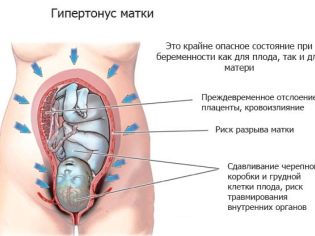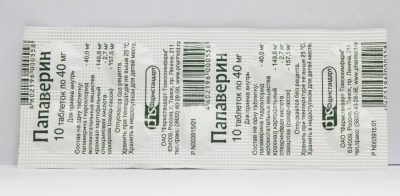Why is Papaverin prescribed during pregnancy and how to use it?
While waiting for the baby, many women have to resort to the use of drugs, which can affect the development of the infant if self-medicating or violating the dosage. One of the most common problems during pregnancy is increased uterine tone. Often it occurs due to a shortage of progesterone, but it can also be provoked by toxicosis, Rh-conflict, stress, disruption of the thyroid gland and other factors.
Hypertonus is manifested by pulling or aching pains in the lower abdomen or in the lumbar region. Such unpleasant symptoms are due to involuntary contraction of the muscles of the uterus, due to which it is constantly tense. This is a danger to gestation and the normal course of pregnancy, so doctors prescribe special drugs, which are able to remove the increased tone of smooth muscles. One of the most famous is papaverine.
Like any other drugs, it should be used in the waiting period of the baby only as prescribed by a doctor. The specialist will take into account the indications, select the correct dose and method of application. Treatment with "Papaverine" without an appointment during pregnancy is undesirable, as is the independent use of this agent for prevention.
Features of the drug
Papaverine produces several pharmaceutical companies in three different forms.
- One of the most sought after are rectal suppositorieswho sell ten pieces in a pack. They are characterized by an elongated shape and yellow-white color. The average price of one package of this over-the-counter product is 50-80 rubles. Keep it at home should be in a cool place, and the shelf life of such suppositories - 2 years.
- No less popular and "papaverine" in pills whose round shape and white shade. They are packaged in boxes of 10, 20 and more tablets, are also sold without a prescription, and are most affordable, as they cost about 10 rubles for 10 pieces. To store such a drug at home is permissible at room temperature, and its shelf life is 3 years.
- The third form of papaverine is solution intended for injection. It is transparent and often colorless, but may be greenish-yellow. One package of this drug includes 5-10 ampoules of 2 milliliters of sterile liquid. Unlike the other two forms, to buy an injection solution, you need a prescription from a doctor, and the cost of 10 ampoules is 30-70 rubles. To store such "Papaverina" you need a cool place, and its shelf life is 2 years.
The action of all forms of medication causes the same substance, which is called "papaverine hydrochloride ". For this reason, sometimes the word "hydrochloride" is included in the name of the drug. One candle contains this compound in a dose of 20 mg, one milliliter of the solution for injections in the same dosage, and one tablet in the amount of 40 mg.
In suppositories, in addition to the active ingredient, there is only a fatty basis, due to which candles have a certain shape and are easy to enter. The tablet form further includes sucrose and stearic acid, as well as starch. In addition to papaverine, edetate disodium and methionine were added to the sterile solution, and the residue was filled with water for injection.
How does it work?
Papaverine hydrochloride has an antispasmodic effect, because under its action smooth muscles relax and its tone decreases. With this drug helps to get rid of the pain that has arisen as a result of spasm of smooth muscles of the intestines, bronchi, stomach, urinary and gall bladder. After taking it, the pain is eliminated, and the functions of the organs are restored.
"Papaverine" also acts on the vascular walls, as a result of which the vessels dilate and the blood pressure begins to decrease. Another organ “target” of such an antispasmodic is the muscular layer of the uterus. Under the action of its active substance, spasmodic parts of the myometrium relax, and their blood supply improves.
Is it used during pregnancy?
In the instructions to the "Papaverine" is usually noted that the use of such a tool during pregnancy is not enough studied, but gynecologists have prescribed this drug to women in the position for several decades and note that Papaverina has no harmful effects on the fetus.
Expectant mothers are often prescribed medication, as noted above, with uterine hypertonus. In the first or second trimester, it helps to avoid abortion and prolongs the process of gestation to a safe period for the baby.
The use of this medication in the later stages not only reduces the risk of too early onset of labor, but also prepares the cervix for disclosure. In addition, the use of "Papaverine" at the beginning of labor allows you to reduce pain due to strong contractions.
However, the increased tone of the walls of the uterus is not the only indication for women in the situation. In addition, the expectant mother can use "papaverine" in other conditions caused by spasms of smooth muscles, including:
- bronchospasmwhich is manifested by a dry cough and can disturb breathing;
- cramping abdominal pain, associated with the digestive tract, for example, if they are caused by intestinal upset;
- headaches due to spasms of cerebral vessels;
- bilious colic if the expectant mother has chronic cholecystitis;
- bladder spasms during the inflammatory process in this organ;
- renal colicprovoked by pyelonephritis and other factors;
- fever with SARS and other infections, proceeding with a simultaneous spasm of peripheral vessels ("white" fever).
Contraindications
Although the drug is safe for a child who develops in the uterus, but its use is unacceptable in case of some pathologies and health problems of the future mother.
Treatment with Papaverin is prohibited if a woman has:
- hypersensitivity to any ingredient of the drug;
- severely impaired liver function;
- atrioventricular block diagnosed;
- revealed glaucoma.
In severe diseases of the kidneys, thyroid gland, heart and other organs, it is permissible to use this medication only under the supervision of a specialist. He should examine the pregnant woman and make sure that the use of "Papaverine" in the presence of such associated diseases is justified.
Side effect
Like any drugs, "Papaverine" can provoke undesirable side effects, even if there are no contraindications to its use, and the dosage is not exceeded. For example, after taking such a drug, some expectant mothers develop an allergic reaction, which is why the drug is immediately canceled.
Sometimes this medicine provokes a decrease in blood pressure, AV blockade, extrasystoles, constipation, or drowsiness. In blood tests after treatment with this medicine, eosinophilia or increased activity of liver enzymes can be detected.
If a pregnant woman has any of these symptoms, you must stop taking the medication and consult a doctor.
How to use?
Suppositories
The most popular form of "Papaverine" during pregnancy can be called suppositories, since pills begin to act later, and with increased tone, the therapeutic effect is required to get as quickly as possible. They are indicated for home use and improve the condition of the pregnant 10-15 minutes after the introduction. In addition to the fact that the active substance is absorbed from the candle faster than from the tablet, it also acts for a longer time.
Use the drug should only after consulting a doctor, who will determine a single dosage suitable for a particular woman. Candles after removal from the packaging injected into the rectum, preferably after natural emptying. Manipulation is performed lying on its side.
Standard single dose - 1 suppository.
The introduction of candles should be performed at equal intervals 2 times a day, and sometimes - three times a day.
Pills
"Papaverine" tablets swallow without crunching and grinding, drinking water. This form is required for headaches, cramps in the intestines and other conditions. Meals do not affect the time of its use, but if problems with the gastrointestinal tract have become the reason for using such “Papaverine” 30 minutes before meals.
Usually a single dose for a pregnant woman is one tablet. This tool is used as needed, but no more than 3-4 times a day.
Injections
If an immediate antispasmodic effect is required, the doctor will prescribe “Papaverine” in injections, since its action begins to develop several minutes after the active substance enters the woman’s body. Injections are usually prescribed intramuscularly, but they can be injected into the vein or under the skin.
Which method is preferable in a particular case, the doctor must determine. For example, if there is a high risk of miscarriage, a woman is hospitalized and immediately given an intravenous injection so that the drug will act as quickly as possible.
The procedure must perform a medical professional. If the drug is administered intravenously, then the “Papaverine” solution is further diluted with isotonic sodium chloride solution.
In order not to provoke a strong decrease in blood pressure, heart rhythm disturbance, and other side effects, infusions are often prescribed. Intramuscular injections are performed twice or thrice a day, with 20-40 mg of the active substance being used for one injection. There should be a break of at least four hours between two injections.
The duration of use depends on the therapeutic effect: in the acute state, the drug is prescribed for 2-5 days, and for the treatment of chronic pathologies a longer course of administration is used, for example, 1-2 weeks.
Reviews
Women who used "Papaverin" in the waiting period of the baby, leave a lot of good reviews about this tool. Among the advantages of this drug is called efficacy, availability and safety. Especially praise candles, because they have a simple composition, and use this form of "Papaverina" is very simple.
According to most expectant mothers, this medicine helped them with the threat and hypertonia, eliminating the discomfort in the lower abdomen.
What to replace?
"No-shpa"
The most famous analogue of "Papaverine" can be called "No-shpu." This medicine belongs to the same group of drugs, as its main ingredient (drotaverine) is also able to relax smooth muscles and eliminate cramps.
"No-shpa" is in demand with hypertonia of the uterus, it is considered a more modern and safe medicine, produced in tablets and solution for injections. This medication can be used for headaches and intestinal cramps. It is allowed at any stage of pregnancy, because it does not violate the development of the fetus.
The main contraindication to the use of "But-shpy" is hypersensitivity.The drug is also not prescribed if the expectant mother has a disruption of the kidneys, liver function is impaired, or heart failure has developed.
You can replace No-shpu, after consulting with your doctor, with any other medicine with the same active compound, for example, take Drotaverine, Spasmol, Spasmonet.
"Viburkol"
Another tool that can be used instead of “Papaverine” with increased uterine tone is “Viburcol”. This is a homeopathic drug with a natural complex composition, produced in the form of rectal suppositories. He noted anti-inflammatory, analgesic, antispasmodic and some sedative effects due to chamomile and belladonnoy.
Future mothers can introduce such candles not only with hypertonia, but also with diseases of the bronchi or urinary organs, as well as with flatulence and SARS. They do not harm the crumbs in the tummy and can be used even in newborn babies.
The only prohibition for the use of "Viburkola" is individual intolerance.
The tool is used rectally, and side effects are extremely rare.
See the next video for more details on uterine tone.



























